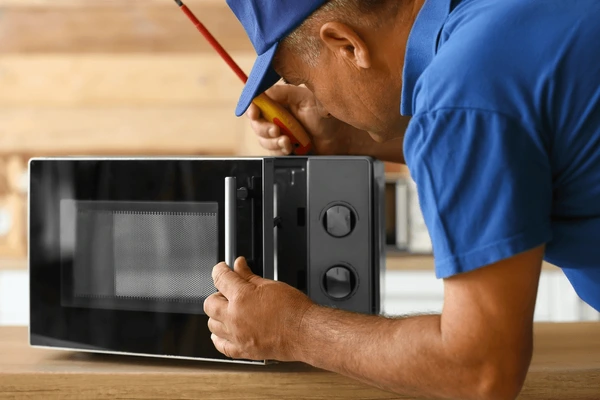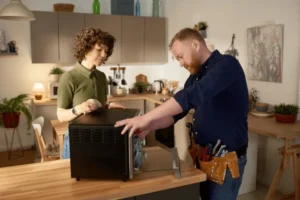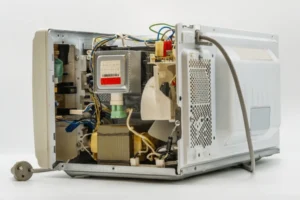
By Admin
Learn how to prevent microwave breakdown at home with simple maintenance habits, expert tips, and trusted guidance from a reputable micro oven repair service.
Microwaves have become an essential part of modern kitchens. From reheating food to preparing quick meals, they save time and effort every day. But like any other appliance, they are prone to wear and tear. The good news is that with mindful usage and regular care, you can significantly reduce the risk of sudden failures.
This guide will walk you through practical, easy-to-follow tips to keep your microwave running smoothly, helping you avoid costly repairs and extend its lifespan.

A microwave breakdown not only disrupts daily routines but can also cause safety hazards if ignored. By taking preventive steps, you can:
Save money on unnecessary repairs
Extend the life of your appliance
Ensure food is cooked evenly and safely
Avoid risks like electrical sparks or fire hazards
Before we dive into prevention, it’s useful to know what typically goes wrong.
Overheating caused by blocked ventilation
Electrical issues due to fluctuating power supply
Food spills and grease damaging internal components
Faulty door seals leading to energy leakage
Excessive load stressing the motor and magnetron
Recognizing these causes helps you adopt smarter usage habits.

Food splatters and grease can interfere with heating and damage internal parts.
Wipe the interior after every use
Use microwave-safe covers to reduce spills
Clean vents and exteriors weekly with a damp cloth
Not all materials are safe for microwave use.
Avoid metal or foil containers that cause sparks
Use heat-resistant glass or ceramic
Check the “microwave-safe” label on plastics
Running an empty microwave strains the magnetron and may cause permanent damage. Always ensure food or liquid is inside when operating.
Microwaves need space to release heat.
Keep at least 2–3 inches of space around the appliance
Avoid enclosing it in tight cabinets without ventilation
Clean the vents to prevent blockages
Heating large quantities at once forces the oven to work harder.
Break food into smaller portions
Use the reheat function instead of maximum power
Follow recommended cooking guidelines
Faulty seals can leak radiation and reduce efficiency.
Inspect regularly for cracks or gaps
Avoid slamming the door shut
Replace damaged seals immediately
Microwaves are sensitive to power surges.
Use a surge protector for safety
Avoid plugging into overloaded sockets
Unplug during thunderstorms or long periods of non-use
Schedule regular servicing: Annual checkups help detect issues early.
Replace worn-out parts: Small parts like light bulbs, rollers, or fuses should be changed when faulty.
Monitor unusual sounds: Buzzing or grinding noises may signal internal problems.
Stay updated on warranty: Many breakdowns are covered if noticed early.
For families that use the microwave multiple times a day, preventive care becomes even more crucial.
Rotate usage between reheating and cooking modes
Avoid stacking heavy utensils inside
Train all family members on safe usage practices
Even with the best care, microwaves may sometimes require expert attention. Professionals can:
Diagnose issues you might overlook
Ensure safety during repairs
Replace parts with authentic components
Guide you on better usage habits
For reliable maintenance and support, RUP Air Condition, a trusted name in micro oven repair service in Kolkata, offers the expertise needed to keep appliances running efficiently.

Q1. How often should I clean my microwave?
Light cleaning after every use is best, with a deep clean at least once a week.
Q2. Can I repair small issues at home?
Minor cleaning and fuse replacement can be done, but electrical or internal faults should be left to experts.
Q3. Why does my microwave spark sometimes?
This usually happens due to metal objects, grease buildup, or a faulty waveguide cover.
Q4. Is it safe to use plastic containers?
Only use containers labeled “microwave-safe.” Regular plastic can release harmful chemicals.
Q5. What’s the average lifespan of a microwave?
With proper care, most microwaves last between 7 to 10 years.
Preventing microwave breakdown is all about consistency in care and mindful usage. With simple habits—like regular cleaning, using safe containers, ensuring ventilation, and monitoring performance—you can avoid major issues and keep your appliance serving you well for years.
A well-maintained microwave is more than a convenience; it’s a safe, reliable partner in your daily kitchen routine.